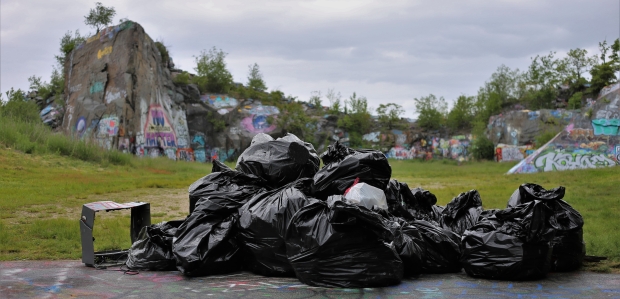
Pawtuckaway Climbers
in 2020, a group of local climbers joined together to form a group known as the Pawtuckaway Climbers Coalition. They merged with SNECC to best organize and begin to works towards establishing access protections and stewardship for a popular climbing area seeing climbing impacts. This may include creating a Climbing Management Plan, or other agreement with the land manager.
Regional Stewardship Plan
In addition to general access issues that the region has, each climbing area has their own specific needs regarding access and stewardship. Started in 2018, the aim of the Regional Stewardship Plan is to organize our areas, assess each one, and to prioritize projects to focus on in the coming years. The goal is to have this complete in the early part of 2019.
Promised Land Protection Project
The Promised Land Protection Project precedes the founding of SNECC. Hundreds of high-quality granite glacial erratic boulders are under threat in the urban forests of Lynn Peabody and Lynnfield. SNECC is currently working with one of the larger landowners to open access on their portion. There are multiple landowners. This area is currently closed to climbing and SNECC respectfully requests climbers visit Lynn Woods until access is secured. Please contact SNECC for more information.
Lynn Woods Boulder Bash
New Englands first outdoor bouldering competition! The event will be a fundraiser for SNECC, and will take place on an annual basis. Lynn Woods is a popular regional bouldering destination. SNECC is hosting an Adopt-A-Crag prior to the event to clean up trails, hopefully establish footpaths to some of the hidden boulders, and general clean-up.
Lynn Woods Stewardship and Conservation Restriction
SNECC has had a good working relationship with the Ranger, the City of Lynn, and the Parks Commission since our founding in 2017. Whether we are hosting the Boulder Bash, helping to clear downed trees, or disseminating messages to the climbing community, we assist these stakeholders in protecting their interests. In 2021, SNECC was made aware that the park is in need of additional protection through a conservation restriction. SNECC will support our ally Essex County Greenbelt to secure this restriction. Stay tuned for more information.
Bartholomew Pond/Ridge Boulders Access
In the rocky terminal moraine of Peabody Massachusetts lies a natural anomaly. Dozens of large boulders scattered along the end of the moraine with high-quality granite classics peppered all over. Current access is legal; however, private residential parcels cross the land, and topography is such that residents may be impacted by noise and visuals. SNECC discussed access to the area with the City of Peabody, and will continue to advocate for solutions.
Historic Quincy Quarries clean-up and protection
Historic Quincy Quarries is currently in worse shape that it has ever been. Graffiti, dumping, crime, and other abuses significantly detract from the climbing, and directly impacts the routes. SNECC is looking for leadership for this project which will involve partnerships with the City, State, and other local advocacy organizations. This area needs significant clean-up including graffiti removal and implementation of a prevention program.
Historic Ship Rock, Peabody, MA access and protection
Historic Ship Rock has been land-locked for decades. It is one of the largest glacial erratics in Massachusetts and home to a dozen or so high-quality granite highball boulder problems (or top-rope routes). The property was acquired by the Peabody Essex Museum way back in the day, and recently sold it. The current status is unknown. SNECC is attempting to reach out to the new owner. We believe it is likely the same owners as the neighboring office building.
Cape Ann Stewardship
Cape Ann has a long climbing history and a reputation for hard slabs, bullet granite, laser cut lines, sandbags, and bold bouldering. It also has a reputation for access issues. A group of dedicated local climbers meet, discusses access, stewardship, parking, anchor management, and whatever else may be going on. They take care of their home climbing. SNECC gives groups like this additional resources for their projects and knits together the small stewardship groups to work together as one regional force.
